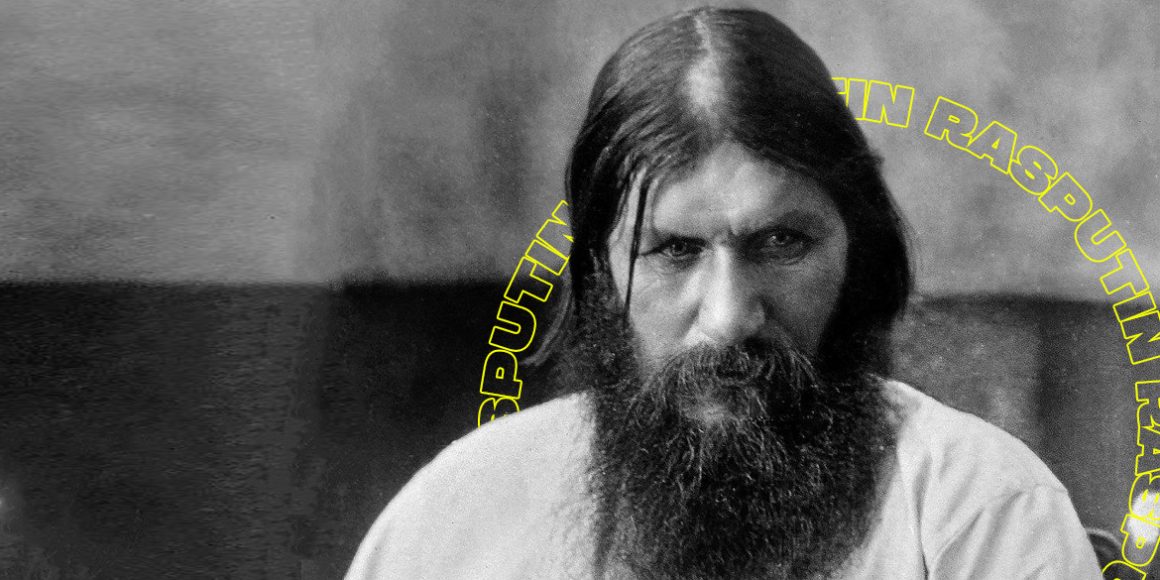He was just a peasant, but he got so much power, he almost destroyed a country. Who was Rasputin, really?
If you use TikTok regularly, you could not miss the latest viral trend: people dancing to the song Rasputin, of the German electropop duo Boney M., published in 1978. Those younger might remember the guy from the animated film Anastasia, and though he was a fictional character. The older one knows about him for sure – he was in a couple of history books. But he was more than just another guy from the past: eccentric, self-proclaimed cult leader, manipulator and close friend of Russian Zar Nikolay II. This is the untold story about Rasputin.
Rasputin’s first days
There lived a certain man in Russia long ago, he was big and strong, in his eyes a flaming glow
Rasputin was born a peasant in the small village in Siberia, in 1869. His father Yefim was a farmer and his mother Anna was a housewife. They had seven other children – all of them died. There were rumors Rasputin had another sister, Feodosiya, but it was unsure if he was her brother or godfather.
Not many details are known about his childhood. Historians tried their best to piece this puzzle, but never fully succeeded. What is a fact is that, as many other peasants of that time, Rasputin failed to have proper education. Instead, it is assumed he had spent his childhood drinking, stealing from locals and undermining authorities. When he was 18, he left Siberia and traveled to Abalak where he met Praskovya Dubrovina. They got married several months later and, in spite of his unholy life, remained together until his death.
At the age of 28, he decided to go on the pilgrimage, and he spent a great deal of years wandering around the country, finding God. His real reasons had nothing to do with God, though: he left his village because he was convicted of the horse theft. Another theory is he had a vision in a church and proceeded to fulfill it, but none one of these were ever proved.
Nonetheless, this helped him establish himself as a “healer”, a prophet if you will. He claimed he could predict the future. Rasputin’s teachings were different from what the Ortodox church taught: he believed the only way to be closer to God is by being a sinner – especially if the sin is to be done with him.
Dirty, filthy lover
Most people looked at him with terror and with fear, but to Moscow chicks he was such a lovely dear
One would say his appearance wouldn’t help him, but that wasn’t the case. He was dirty, filthy, unshowered at all times, but his followers grew, and he didn’t treat them well. Rumour has it he would often dip his fingers into jam and then ask women to lick them clean.
Other women had to bathe him, completely nude. But the climax of his holy work was much simpler – it was always about a climax with other women. That didn’t bother his wife – she stayed loyal, and they had three children together.
All these stories, especially those in which his magical powers heal people, opened the doors to the Russian upper class of the time, especially Russian Tsar Nicholas II and his wife Alexandra, as they sought someone to cure their sick son.
Though she’d heard the things he’d done, she believed he was a holy healer, who would heal her son
Young Alexei suffered from haemophilia – his body couldn’t create blood clots, which were needed to stop bleeding. Doctors hadn’t been able to help them, so Alexandra sought further – until Rasputin came along. Allegedly, he stopped kid’s bleeding in 1908, solely by the power of prayer. He immediately became a friend to the Romanov family. 5 years later, Alexei was almost dead. When he heard that, Rasputin sent a telegram, to the Queen, saying the Prince will survive if the doctors leave him alone. “The little one will not die. Don’t allow doctors to bother him too much.” Truthfully, he survived and Rasputin was praised again.
The rise and rise of Rasputin
The rise of Rasputin was enormous. His popularity rose as quickly as the Romanovs were losing theirs: they weren’t really popular to begin with. Nicholas III failed to achieve what his father Alexander III did, while Alexandra was always treated as a spy, being from German. Their friendship with mystic monk only infuriated people. Romanovs were so obsessed with Rasputin that they didn’t let rumors shake up their relationships – and there were many. From stories he wanted to get in bed with Alexandra to attacks on family friends: this dynasty was dedicated to their strange friend – all because he is healing their son.
With the beginning of World War I, Nicholas II had to command the forces himself. By September 1915, Alexandra was left in charge of the state, and her help was Rasputin. Without doubt, he became the most powerful man in the country. And he wasn’t doing a good job: he removed people he didn’t like from important positions and blackmailed those who were about to avoid the front line. It became clear this person had to be killed – and the monarchy must fall down, too.
The end of the life and the beginning of the myth
Then one night some men of higher standing, set a trap, they’re not to blame
What had happened on 29 December 1916 is still not clear. But historian says Rasputin spent the whole day drinking wine and having fun with his admirers in the bath house. He was drunk by the evening, so he decided to pay a visit to Irina, young wife of Prince Feliks Yusopov, who was Nicholas niece. But Feliks, who was hiding in the house with several other people, had a plan to get rid of him.
While waiting for Irina, Rasputin was served wine and cakes filled with cyanide. Although there was enough poison to kill 5 men, he was allegedly strong enough to stay alive. That pissed off Yusopov, who decided to shoot him at close range. But Rasputin was still alive. While Feliks and his friends celebrated the long awaited death, Rasputin managed to escape the room – but not for long. Feliks caught up with him in the courtyard and shot him for the second time. Rasputin was still twitching, so the gang started beating him. After that, they wrapped him up in a carpet and threw him in the Neva River. Water washed up his body several days later.
As Russia celebrated, Alexandra was saddened by the news of Rasputin’s death. The public was for his death, so the Tsar was afraid to punish his killers too tough to avoid further violence. But, Romanovs were getting weaker and weaker and almost lost all the power. The February Revolution, in the works for some time, finally broke in 1917 in St Petersburg: the army failed to listen to Nicholas, and he was forced to abdicate.
On 17 July 1918, Nicholas, Alexandra and their five children were executed. This was the end of the Romanovs rule, which lasted more than 300 years. Although never confirmed, Rasputin allegedly predicted this will happen, when he wrote them the warning before his own death: “If I am killed by common men, you and your children will rule Russia for centuries to come; if I am killed by one of your stock, you and your family will be killed by the Russian people.” It fits the story, but the authenticity of this letter was the same as Rasputin’s life: moldy, dark and full of fantasies.

















